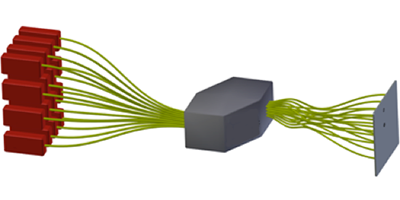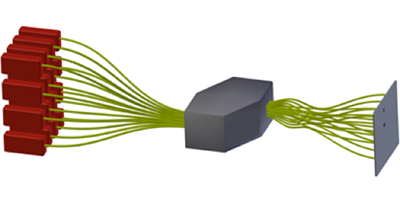Quantum Legos
Quantum computing offers great potential information processing power by harnessing the entanglement of many qubits in service of useful tasks. Getting from individual qubits to an actual working device is a major challenge, however: a large number of logic elements that store and manipulate qubits need to communicate over data channels without degrading. In a paper in Physical Review A, researchers from the MUSIQC (Modular Universal Scalable Ion-trap Quantum Computing) program, a multiuniversity effort lead by Duke University, confront this problem with a proposed modular quantum computing design that is scalable to a large number of qubits while remaining fault tolerant.
The authors envision basic building blocks consisting of elementary logic units (ELUs)—arrays of trapped ions whose entanglement can be controlled with optical or microwave pulses. The ions act as qubits within the ELUs that would be entangled with qubits in other ELUs through optical fiber connections. Monroe et al. imagine that these fibers enter a microelectromechanical cross-connect switch (imagine a tiny quantum version of a telephone switchboard) that routes signals between ELUs. Computations proceed by a series of measurements of the qubits, with photon detection done by optical fibers from the switch to a CCD array.
Monroe et al. conclude that because of its modularity—the building blocks of ELUs plus a completely reconfigurable optical network—this design is scalable to a large number of qubits. And their analysis shows that the architecture is surprisingly resilient against errors. Just as silicon technology took off because microcircuits could be scaled to ever-larger collections of transistors, such modular systems might put practical quantum computing on a path toward realization. – David Voss





